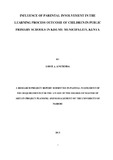| dc.description.abstract | Education is a very important pillar of life since it defines the future of our children. However,
it is faced with challenges, some which include parental involvement. The purpose of the study
I was to investigate the influence of parental involvement in the children's learning process
outcome in public primary schools in Kisurm; Municipality. The study was designed to fulfil
four objectives namely: to assess the extent to which school visitation as a component of
parental involvement has influenced the children's learning process outcome, to determine the
level at which provision of healthy learning environment as a component of parental
involvement has influenced the children's learning process outcome, to establish how constant
communication by the school as a component of parental involvement has influenced the
children's learning process outcome and to investigate the extent to which volunteering in
school activities by the parents as a component of parental involvement has influenced the
children's learning process outcome. Literature study investigated existing programmes: School
visitation, Provision of healthy learning environment, constant communication by the school
, and volunteering in school activities by the parents as components of parental involvement in
, schools. The study adopted descriptive survey study in investigating the influence of parental
involvement. This design was used because it described the variables in order to answer the
research questions. The target population was 236 administrators (head teachers and deputy
head teachers). The study covered all the public primary schools in the Municipality since more
than 100 respondents are recommended for Social Science research. Questionnaires were used
for primary data collection. Pilot testing was done in the 10 neighbouring schools in Rongo
town to assess the validity and reliability of the instrument. Descriptive statistical components
such as measures of central tendencies and dispersions were used to analyse the responses,
I concerns and views of the respondents to give general descriptions of data. 'in order to ensure
validity, research instruments were subjected to review by supervisors to ensure they captured
the relevant data. The tools were also subjected to peer review by colleagues to facilitate
, revision of research questions, hence clarity was enhanced. This was done after a test and retest
to determine the instruments accuracy, adequacy and dependability. Reliability of the
questionnaire was tested to assess the internal consistency of the instrument. The analysed data
were then presented in tables. The study findings established that school visitation as a
component of parental involvement, provision of healthy learning environment as a component
of parental involvement, constant communication by the school as a component of parental
involvement and volunteering in school activities by the parents as a component of parental
involvement have influenced the children's learning process outcome. It also established that
when parents visit school, the performance improves. This was evident at 141 (61.9%) good and
',24(20.5%) excellent. When healthy learning environment is provided, the performance was
evident at 106 (46.5%) good and 46 (20.2%) excellent. When parents involve in a constant
communication with the school, the pupils' performance improves. This was evident at 130
(57%) good and 70 (30.7) excellent. When parents volunteer to participate in school activities,
the children performed well. This was evident at 180 (78.9%) good and 12(5.3) excellent. The
study concluded that parental involvement has influenced the children'S' learning process
outcome in the public primary schools in Kisumu Municipality. The study recommended that
the government should address issues that can improve parental involvement in schools by
, documenting school- parental policies to enable their participation in the school activities and
,I that more funds are set aside to finance the food programmes. Communities to be sensitised on
the importance of parental involvement. Areas that require further study include replicating the
, same study in public primary schools in rural areas and future research to include the views of
the parents. | en_US |

